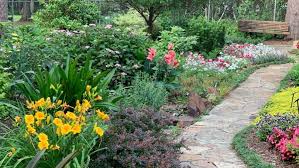
Creating Your Eco-Friendly Garden
Creating an eco-friendly garden is not only beneficial for the environment but also for your own well-being. By incorporating sustainable practices into your gardening routine, you can reduce your carbon footprint, support local wildlife, and create a beautiful and thriving ecosystem right in your backyard.
Choose Native Plants
One of the best ways to create an eco-friendly garden is to choose native plants that are well-adapted to your local climate and soil conditions. Native plants require less water, fertilizer, and pesticides, making them more sustainable and easier to maintain.
Compost and Mulch
Composting kitchen scraps and yard waste can help reduce waste sent to landfills while providing nutrient-rich soil for your garden. Mulching around plants helps retain moisture, suppress weeds, and improve soil health naturally.
Water Wisely
Conserving water is essential for an eco-friendly garden. Consider installing a rain barrel to collect rainwater for irrigation or using drip irrigation systems to deliver water directly to plant roots where it’s needed most.
Avoid Chemicals
Avoiding synthetic pesticides and herbicides helps protect pollinators like bees and butterflies while preventing harmful chemicals from entering the ecosystem. Opt for organic pest control methods or natural alternatives whenever possible.
Create Habitat for Wildlife
Encourage biodiversity in your garden by creating habitat for wildlife such as birdhouses, bee hotels, butterfly gardens, or small ponds. Providing food sources and shelter for local wildlife helps maintain a balanced ecosystem.
Sustainable Garden Design
Designing your garden with sustainability in mind can maximize energy efficiency and minimize waste. Consider using recycled materials for pathways, choosing energy-efficient lighting options, or incorporating permeable surfaces to reduce runoff.
In conclusion, creating an eco-friendly garden is a rewarding endeavor that benefits both you and the environment. By following these sustainable gardening practices, you can enjoy a beautiful outdoor space that supports biodiversity, conserves resources, and promotes a healthier planet for future generations.
6 Tips for Creating an Eco-Friendly Garden: Support Wildlife, Conserve Resources, and Reduce Waste
- Use native plants to support local wildlife.
- Conserve water by using a drip irrigation system.
- Compost kitchen scraps and yard waste for natural fertilizer.
- Avoid chemical pesticides and opt for natural pest control methods.
- Plant trees strategically to provide shade and reduce energy consumption.
- Incorporate recycled materials into garden decor and structures.
Use native plants to support local wildlife.
Using native plants in your garden is a simple yet powerful way to support local wildlife and create an eco-friendly environment. Native plants provide food and shelter for birds, insects, and other wildlife species that have evolved to rely on them for survival. By incorporating native plants into your garden landscape, you can help preserve biodiversity, attract pollinators like bees and butterflies, and contribute to the overall health of your local ecosystem. It’s a win-win situation where you get to enjoy a beautiful garden while also making a positive impact on the environment around you.
Conserve water by using a drip irrigation system.
Conserving water is essential for maintaining an eco-friendly garden, and one effective way to achieve this is by using a drip irrigation system. Drip irrigation delivers water directly to the roots of plants, minimizing evaporation and runoff compared to traditional sprinkler systems. By providing targeted hydration where it’s needed most, a drip irrigation system not only helps reduce water waste but also promotes healthier plant growth and soil conservation. Incorporating this sustainable watering method into your garden routine can significantly contribute to water conservation efforts while supporting a thriving and eco-conscious garden ecosystem.
Compost kitchen scraps and yard waste for natural fertilizer.
Composting kitchen scraps and yard waste is a simple yet effective way to create natural fertilizer for your eco-friendly garden. By recycling organic materials like fruit and vegetable peels, coffee grounds, grass clippings, and leaves, you can enrich the soil with essential nutrients while reducing waste sent to landfills. Compost acts as a sustainable alternative to chemical fertilizers, promoting healthy plant growth and improving soil structure. Embracing composting as part of your gardening routine not only benefits your plants but also contributes to a more environmentally conscious and sustainable lifestyle.
Avoid chemical pesticides and opt for natural pest control methods.
By avoiding chemical pesticides and opting for natural pest control methods in your eco-friendly garden, you can protect beneficial pollinators like bees and butterflies while safeguarding the overall health of your garden ecosystem. Natural pest control methods, such as companion planting, introducing beneficial insects, and using organic sprays like neem oil, not only target pests effectively but also promote a harmonious balance in your garden without harmful chemicals disrupting the environment.
Plant trees strategically to provide shade and reduce energy consumption.
Planting trees strategically in your garden can have a significant impact on creating an eco-friendly environment. By strategically placing trees to provide shade around your home, you can reduce energy consumption by lowering the need for air conditioning during hot summer months. Not only do trees offer natural cooling benefits, but they also enhance the beauty of your landscape and provide habitat for wildlife. Investing in tree planting as part of your sustainable gardening practices is a simple yet effective way to promote energy efficiency and environmental conservation in your outdoor space.
Incorporate recycled materials into garden decor and structures.
By incorporating recycled materials into your garden decor and structures, you can add a unique and eco-friendly touch to your outdoor space. Repurposing items such as old containers, pallets, or salvaged wood not only reduces waste but also adds character and creativity to your garden design. From creating raised beds and trellises to crafting garden art and seating areas, using recycled materials allows you to showcase your sustainable mindset while adding a personal touch to your eco-friendly garden.
